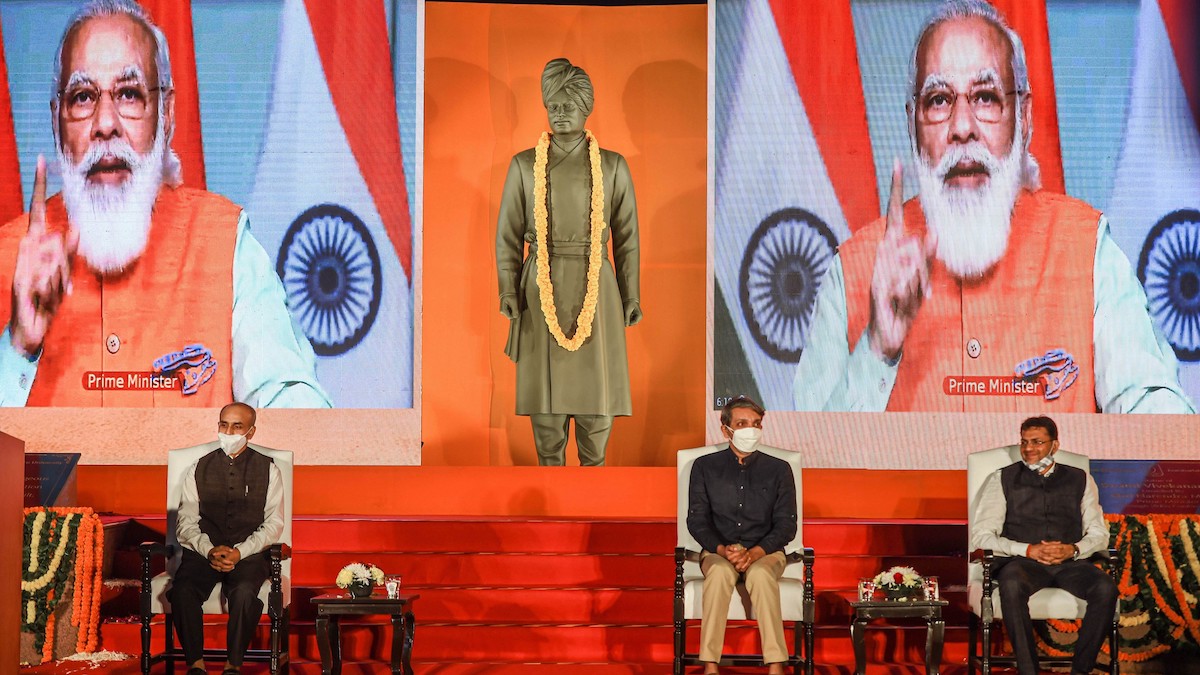Prime Minister Narendra Modi on Thursday unveiled a life-size statue of Swami Vivekananda at the Jawaharlal Nehru University campus via videoconferencing. Addressing the students, he said it was of utmost importance that individual ideologies are aligned with national interest and that giving priority to one’s ideology over the nation’s interests is harmful to the democratic system. He also cited instances from the Emergency period to state how people with opposing ideologies came together for a common cause.
This small excerpt from the prime minister’s speech requires a deeper analysis.
The Preamble to the constitution of India recognises liberty in five major areas – liberty of thought, expression, belief, faith and worship. The enforcement of the rights covered under this part of the Preamble determines the degree of liberty and individuality that a person enjoys. It is an undeniable fact that absolute liberty is highly prone to misuse, and that a substantially higher degree of liberty will promote a greater individuality.
The issue of curtailing someone’s freedom and liberty becomes complex when his ideology comes in conflict with national interest. The same has been highlighted in the prime minister’s speech. The phrase that concerns me is ‘national interest’. If we go by the dictionary definition, then the term is majorly used in the context of foreign policy, primarily to justify a governmental action on an international platform. But there is a difference between national relations and international relations. National relations majorly deal with the relation between state and its subjects. So the question arises – who defines ‘national interest’?
When the prime minister talks about individuality then he shouldn’t forget that under his regime, a political climate has been created that places majoritarian views above an individual’s views. India is witnessing unprecedented instances of arrests of a large number of journalists, media persons, scholars, teachers, professors, students, RTI activists, and witch hunting of human rights organisation. Draconian laws like Unlawful Activities Prevention Act, the National Securities Act and sedition laws are used to target these people for holding contrary views. The position is quite similar to the one that was highlighted by the renowned philosopher John Stuart Mill in his ground breaking work on liberty,
“If all mankind minus one, were of one opinion, and only one person were of the contrary opinion, mankind would be no more justified in silencing that one person, than he, if he had the power, would be justified in silencing mankind.”
Not everything that state does is in the interest of the nation – some actions are partially or completely driven by political considerations. The job of judging the conformity of these actions with national and individual interests lies with critics. When the state starts to use a political narrative to define the national interest in a way that justifies its actions, supports its political gains and helps it to retain power, then it becomes problematic as anyone holding a contrary view can be easily branded an ‘anti-national’.
Also read: The Useless Glory of Statues and Other ‘Wonders of the World’
Detaining people just because they criticised the government’s actions or they believe in a different political ideology, framing policies that target a particular section of the society, creating a social climate that promotes intolerance, mob lynching, hate crimes, and branding anyone ‘anti-national’ is a result of this flawed definition of ‘national interest’.
According to Mill, minority views secure their own important position in a forum of democracy.
“The peculiar evil of silencing the expression of an opinion is that it is robbing the human race; posterity as well as the existing generation; those who dissent from the opinion, still more than those who hold it. If the opinion is right, they are deprived of the opportunity of exchanging error for truth: if wrong, they lose, what is almost as great a benefit, the clearer perception and a livelier impression of truth, produced by its collision with error.”
What can be inferred from this statement is that the only way in which the veracity of a statement or an action can be tested is by putting it forth for any kind of criticism. Inviting diverse opinions will ensure that no space for doubt is left. This can only be achieved when an individual is free to believe in his conscience and express his views without fear of political and social consequences.
The ideal democracy opens a forum for discussion, debates, and voting. The dream of an ideal democracy can only be realised when there is an unimpeded exchange of views in a free market place of ideas. Liberty and individuality goes hand in hand and so does national and individual interests. More so, it becomes the state’s responsibility to judiciously draw a balance between national interest and individual interest, rather asking an individual to align his views with a state sponsored interpretation of the term national interest.
Shomesh Srivastava is a second year student pursuing BA LLB (Hons) at National Law University, Odisha.
Featured image: PM Narendra Modi addresses a gathering after virtually unveiling the statue of Vivekananda at JNU, November 12. Photo: PTI

